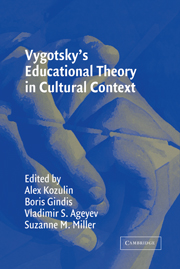Book contents
- Frontmatter
- Contents
- List of Contributors
- Series Foreword
- Introduction: Sociocultural Theory and Education: Students, Teachers, and Knowledge
- PART I CONCEPTS AND PARADIGMS
- 1 Psychological Tools and Mediated Learning
- 2 The Zone of Proximal Development in Vygotsky's Analysis of Learning and Instruction
- 3 Vygotsky's Doctrine of Scientific Concepts
- 4 Some Cognitive Tools of Literacy
- 5 Dynamic Assessment of the Evolving Cognitive Functions in Children
- PART II DEVELOPMENT AND LEARNING
- PART III SOCIOCULTURAL THEORY APPLICATION IN THE CLASSROOM
- PART IV DIVERSE LEARNERS AND CONTEXTS OF EDUCATION
- Author Index
- Subject Index
- Titles in the series
- References
1 - Psychological Tools and Mediated Learning
Published online by Cambridge University Press: 05 June 2012
- Frontmatter
- Contents
- List of Contributors
- Series Foreword
- Introduction: Sociocultural Theory and Education: Students, Teachers, and Knowledge
- PART I CONCEPTS AND PARADIGMS
- 1 Psychological Tools and Mediated Learning
- 2 The Zone of Proximal Development in Vygotsky's Analysis of Learning and Instruction
- 3 Vygotsky's Doctrine of Scientific Concepts
- 4 Some Cognitive Tools of Literacy
- 5 Dynamic Assessment of the Evolving Cognitive Functions in Children
- PART II DEVELOPMENT AND LEARNING
- PART III SOCIOCULTURAL THEORY APPLICATION IN THE CLASSROOM
- PART IV DIVERSE LEARNERS AND CONTEXTS OF EDUCATION
- Author Index
- Subject Index
- Titles in the series
- References
Summary
What is the secret of Vygotsky's popularity? Why does a theory developed in Moscow a few years after the Russian Revolution capture the imagination of American educators at the beginning of the 21st century?
One possible explanation of this puzzling phenomenon is that Vygotsky's theory offers us answers to the questions that were not asked earlier. It is only now that we have started posing questions that make Vygotsky's “answers” relevant. Following this logic of explanation, instead of starting with a systematic exposition of Vygotskian theory, I would first focus on those contemporary questions that highlight the relevance of sociocultural theory.
Question 1: Multiculturalism. The issues of culture and learning have been inseparable for centuries for the simple reason that one of the main goals of learning is the transmission of culture from generation to generation. Nevertheless, the majority of educators were oblivious of this cultural element until confronted with it in the reality of the multicultural classroom. In a monocultural environment culture remains mostly invisible, and educators start paying attention to it only when two or more cultural patterns are empirically present in the same classroom at the same time. One may say that Vygotsky had a certain advantage in this respect because he worked in a period of great social upheaval that put different social and ethnic groups into the same educational focus. The issues of literacy, as well as ethnic and cultural diversity, were much more obvious for Vygotsky and his colleagues than for their Western contemporaries.
- Type
- Chapter
- Information
- Vygotsky's Educational Theory in Cultural Context , pp. 15 - 38Publisher: Cambridge University PressPrint publication year: 2003
References
- 178
- Cited by

